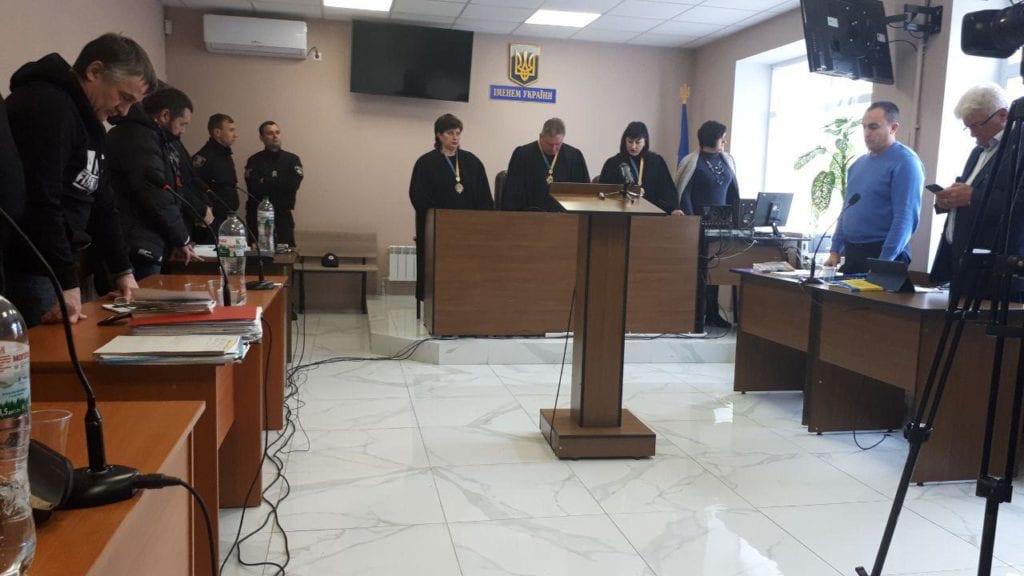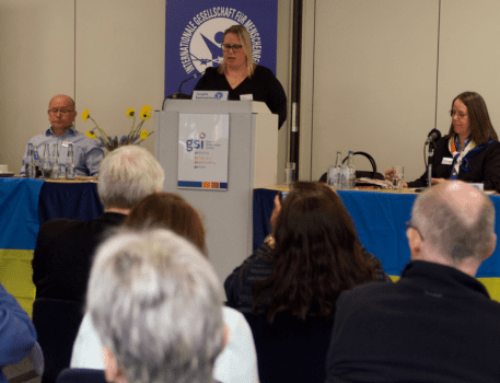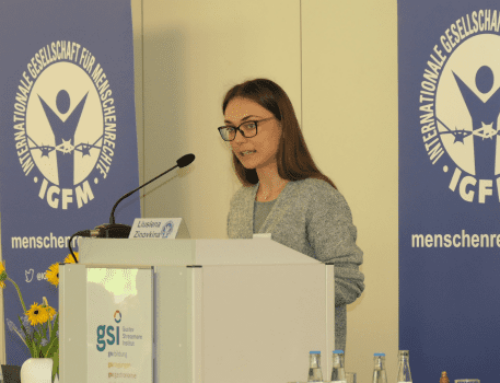Monitoring of the case of A. Melnik, A. Kryzhanovsky, I. Kunik (session 03.11.20)

On March 11, a regular court session was held in the Gadyatsky District Court of the Poltava Region in the case of the head of the “Visit” television company Alexander Melnik, who is one of the three accused (together with A. Kryzhanovsky, I. Kunik) in the murder of the mayor of Kremenchug A. Babayev and Judge of the Kremenchug court A. Lobodenko.
At the hearing, the court continued the study of written evidence.
In addition, for March 11 was scheduled consideration of appeals against the decisions of the Gadyatskiy court in the Kharkov Court of Appeal to extend the measure of restraint to the accused A. Kryzhanovsky and A. Melnik.
During the judicial review, the court announced a break for the defense of Melnik and Kryzhanovsky to participate in the consideration of appeals in the video conference mode. Lawyers, during the consideration of appeals, filed applications to challenge the board of the court, which were denied. Subsequently, appeals against the decisions of the Gadyatsky District Court of December 17, 2019 were examined on the merits. The measure of restraint, by this definition was extended until 02/14/2020. Thus, as of the time of consideration of the appeal, the determination has expired long ago (the determination to apply the measure of restraint expires after the expiration of the determination (Article 203 of the Code of Criminal Procedure of Ukraine).
ISHR experts have already repeatedly pointed out the ineffectiveness of appeal mechanisms for determination in resonant cases. Firstly, after many years of judicial review in the region, it is difficult to form a panel in the court of appeal. The vast majority of judges of the Poltava Court of Appeal in one way or another took part in this case. Thus, judges recuse themselves, after which the Supreme Court determines jurisdiction in another region. During this time, the definition expires. Secondly, in other cases, for example, in the case of Alexander Chibirdin, the ISHR has already faced a situation where the appellate court officially, because of congestion, ordered the consideration of the appeal to extend the measure of restraint in the form of detention after it has lost its validity period. In fact, the accused in such cases are deprived of the opportunity to exercise the right of appeal against detention and this is happening systematically. This situation is of particular concern to the International Society for Human Rights for the reason that observers often state that there is insufficient (according to the criminal procedure) justification by the prosecutor of the need for an exceptional measure of restraint, or even file a petition without justifying the risks provided for in the Criminal Procedure Code.
The Kharkov Court of Appeal once again dismissed the appeal, because the validity of the decision of the Gadyatskiy court has been exhausted.
After the break, the Gadiaksky court resumed the hearing and continued to examine the evidence in the case.
The prosecutor read out a request for adding an optical disk with a recording of the testimony of the accused I. Kunyk obtained at the pre-trial investigation stage.
The defense categorically objected to the satisfaction of the petition of the prosecution, indicating that in accordance with part 4 of art. 95 of the Code of Criminal Procedure of Ukraine, the court can substantiate its findings only on the evidence that it directly perceived during the trial. The court does not have the right to substantiate its decisions with evidence that was given to the investigator, prosecutor, or refer to them (part 4 of article 95 of the Code of Criminal Procedure of Ukraine).
The European Court of Human Rights notes that although Article 6 of the ECHR guarantees the right to a fair trial, it does not establish any rules for the admissibility of evidence as such, which is primarily a regulatory issue in accordance with national law (“Schenck v. Switzerland”, para. 46). Consequently, the Court should not determine in principle whether specific types of evidence could be admissible, including the testimony of the absentee accused, or whether the applicant was guilty or not. The question that needs to be answered is whether the proceedings as a whole, including the method of obtaining evidence, were fair (“Lutsenko v. Ukraine”, paragraph 42).
The Court has previously found that in cases where the domestic judicial authorities are confronted with several conflicting versions of the truth proposed by the same person, their final preference for the statement made to the investigating authorities over the statement made in open court does not raise the issue in accordance with the Convention, where this preference is justified and the statement itself was given at the person’s own will. On the other hand, the credibility of evidence will be undermined if it is obtained in violation of the right to silence and privileges against self-incrimination. In particular, the right not to incriminate oneself implies that the criminal prosecution seeks to prove its case against the accused, without resorting to evidence obtained using methods of coercion or harassment, contrary to the will of the accused. Where doubts arise as to the reliability of a particular source of evidence, the need to confirm this with evidence from other sources is correspondingly higher (paragraph 49 “Lutsenko v. Ukraine”).
The panel of judges, having consulted on the spot, decided to attach the evidence to the case, and give an assessment to them in the deliberation room during the sentencing.
The next hearing is scheduled for 03/12/2020.
Experts from the International Society for Human Rights will continue to monitor this trial.








Leave A Comment